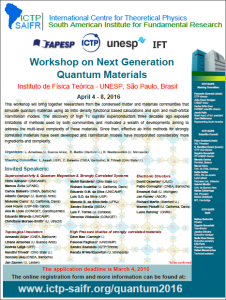Workshop on Next Generation Quantum Materials

Ends on: April 8, 2016
Location: São Paulo, Brazil
Venue: IFT-UNESP
Organizers:
- Liliana Arrachea (ICAS-Universidad de San Martin, Argentina)
- Richard Martin (Stanford University, USA)
- Eduardo Miranda (UNICAMP, Brazil)
- Renata Wentzcovitch (University of Minnesota, USA)
Steering committee:
- Lucy Assali (Universidade de São Paulo, Brazil)
- Carlos Balseiro (Centro Atomico Bariloche, Argentina)
- Nandini Trivedi (Ohio State University, USA)
Invited speakers:
- Eric C. e Andrade (IFSC – São Carlos, Brazil)
- Marcos Ávila (Universidade Federal do ABC, Brazil)
- Carlos Balseiro (Centro Atómico Bariloche, Argentina)
- Alberto Camjayi (Universidad de Buenos Aires, Argentina)
- Jose Hoyos (USP-São Carlos, Brazil)
- Caio Lewenkopf (Universidade Federal Fluminense, Brazil)
- Ana M. Llois (CONICET – Centro Atomico Constituyentes, Argentina)
- Eduardo Miranda (UNICAMP, Brazil)
- Philip W. Phillips (University of Illinois at Urbana-Champaign, USA)
- Tatiana G. Rappoport (Universidade Federal do Rio de Janeiro, Brazil
- Eduardo Granado Monteiro da Silva (UNICAMP, Brazil)
- Luis Gregório Dias da Silva (USP – São Paulo, Brazil)
- Veronica Vildosola (CONICET – Centro Atomico Constituyentes, Argentina)
Electronic Structure
- Pablo Cornaglia (Centro Atómico Bariloche, Argentina)
- Emanuel Gull (University of Michigan, USA)
- Jan Kunes (Academy of Sciences Czek Republic)
- Richard Martin (Stanford University, USA)
- Francesco Sottile (European Theoretical Spectroscopy Facility (ETSF) – Paris, France)
- Lucas K Wagner (University of Illinois at Urbana-Champaign, USA)
Topological Systems
- Liliana Arrachea (Universidad de Buenos Aires, Argentina)
- Alejandro Lobos (Universidad de Rosario, Argentina)
- Gonzalo Usaj (Centro Atómico Bariloche, Argentina)
- Jan Zaanen (University of Leiden, The Netherlands)
High Pressure studies of strongly correlated materials
- Xiao-Jia Chen (HPSTAR – Beijing, China)
- Pascoal Pagliuso (UNICAMP, Brazil)
- Sandro Scandolo (ICTP-Trieste, Italy)
- Renata M Wentzcovitch (University of Minnesota, USA)
Description:
Quantum mechanical effects play a defining role in materials properties exploited by modern technologies. The electronic energy level organization in solids with weakly interacting electrons distinguishes conductors from insulators. The semiconductor electronics revolution resulted from the manipulation of materials poised between these limits whose conducting properties could be easily tipped one way or another by small gate voltages. A similar revolution is offered by manipulating properties of materials with strongly interacting electrons. An example was the discovery and application of giant magneto-resistance (GMR), summarized in the New York Times headline, “Physics of Hard Drive Wins Nobel”(D. Overbye, N.Y. Times, October 10, 2007). Equally significant has been the discovery that in addition to symmetry, topology plays a crucial role in the nature of the quantum phase. The discovery of 2D topological insulators has recently been followed by the proposal of additional topological systems, including 3D topological systems, topological superconductors, and Weyl semimetals.
This workshop aims to bring together researchers from the condensed matter and materials communities simulating quantum materials but using traditionally different approaches: a) ab initio density functional based calculations and b) spin and multi-orbital Hamiltonian models. The discovery of high Tc cuprate superconductors three decades ago exposed limitations of methods used by both communities and motivated a wealth of developments aiming to address the multi-level complexity of these materials. Since then, effective ab initio methods for strongly correlated materials have been developed and Hamiltonian models have incorporated considerably more ingredients and complexity. These two communities are no longer separated by their distinct approaches but are integrated by the common issues they address. The workshop also aims to emphasize high pressure research as a means to manipulate interaction strengths and uncover quantum phase behavior.
Representative topics in this workshop include:
1) simulation methods for strongly correlated materials (ab initio and Hamiltonian models)
2) Superconductivity (cuprates and iron pnictides and chalcogenides)
3) Topological insulators
4) Giant magnetoresistance materials
5) High pressure and temperature studies (spin crossovers in earth minerals, cobaltites, superconductivity, etc)
Announcement
List of Confirmed Participants: Updated on April 4
Abstracts:
Photos:
Workshop Program: updated on April 4
Click on the title of the talks to watch the videos
Additional Information:
Registration: ALL participants and speakers should register. The registration will be on April 4 at the institute, from 12:45 to 13:45. You can find arrival instruction at http://www.ictp-saifr.org/?page_id=195
Accommodation: Participants and Speakers whose accommodation has been provided by the institute will stay at The Universe Flat. Each participant/speaker, whose accommodation has been provided by the institute, has received the accommodation details individually by email.
Poster presentation: Participants who are presenting a poster MUST BRING THE POSTER PRINTED. The poster size should be at most 1,5m x 1m. Please do not bring hanging banner, only sticking poster.
Emergency number: 9 8233 8671 (from São Paulo city); +55 11 9 8233 8671 (from abroad), 11 9 8233 8671 (from outside São Paulo).
Ground transportation instructions:
Ground transportation from Guarulhos Airport to The Universe Flat
Ground transportation from Congonhas Airport to the Universe Flat
Ground transportation from The Universe Flat to the institute
